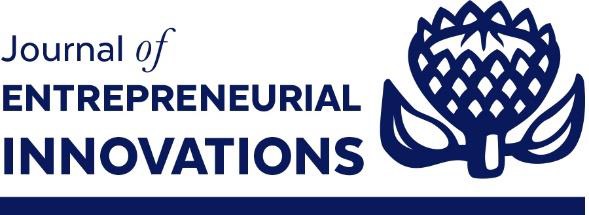About the Journal

ISSN: 2708-6224/ eISSN: 2708-6232
About the Journal of Entrepreneurial Innovations
(JEI)
The Journal of Entrepreneurial Innovations (JEI) is a free open access, free to publish online journal that is published by the Department of Management & Entrepreneurship (DME) at the University of the Western Cape. The JEI specialises in publishing research and analyses pertaining to entrepreneurship trends and particularly innovations in the small, medium, and micro enterprises (SMMEs).
By definition, entrepreneurship is a cross-disciplinary concept; as such, JEI encourages authors to position their research from multi- and inter-disciplinary perspectives. JEI seeks to enhance scholastic discourse in the numerous disciplines that affect SMMEs and entrepreneurship. This includes accounting, finance, general management, leadership, microfinance, entrepreneurship, small business management, management information systems, business law, marketing, project management, poverty alleviation, sustainable development, and ethics, among others. Above all, the journal seeks to provide greater dissemination of information and knowledge in these disciplines.
JEI’s Publication policy
JEI is a double blind peer-reviewed journal that is published as an open-access online journal. One volume constituting three issues (March, July, October) is published once a year.
The types of papers published include:
a) Research papers: these report on empirical scientific studies that provide new insights into theory, practice as well as methodologies applied to reach and verify findings of important concerns within emerging markets. Although there are no strict length requirements that are stipulated for this type of publications, research papers usually range from 5, 000 words to 7, 000 words (approx. 7 - 12 manuscript pages). JEI imposes a word limit of 10, 000 words per manuscript.
b) Conceptual papers: conceptual papers (i.e., ideas, concepts, or frameworks not yet empirically tested) are also encouraged. Submissions of this nature often includes the examination of novel theories, concepts, and ideas. The length of conceptual papers usually does not vary from research papers and can range from 5, 000 words to 7, 000 words (approx. 7 - 12 manuscript pages).
c) Reviews: the journal also seeks to publish reviews of various publications including books, articles, and other contemporary phenomena. Generally, reviews are shorter in length, at approximately 2 to 4 manuscript pages.
d) Technical Reports: are usually written for a non-academic audience such as business managers and practitioners. The emphasis of technical reports is to encourage the dissemination of practical knowledge, which is of great importance but rarely published. These publications typically range from 2 to 5 pages.
e) Case studies: these are specific in-depth analyses of individual phenomena, businesses, or events. Case studies allow for a detailed introspection into a single phenomenon that facilitates problem solving.
f) Conference Special Issues: in certain instances, approved conference proceedings will be published in the Journal of Entrepreneurial Innovations as a Special Issue. All papers presented at such conferences will be published after going through the normal (double-blind) review process.
g) Doctoral proposals: as a means to promote the publication of research and scientific material of new and upcoming scholars, JEI encourages doctoral students to publish their research proposals. This is a unique offering for PhD students; this is particularly true given that PhD candidates in the developing world have limited research experience and not too many options to publish their work, this journal provides this platform as a research mentorship and training platform. Qualified supervisors will provide constructive feedback and the concerned candidates will be afforded the opportunity to improve on their proposals and theses. Specific guidelines are provided for Doctoral proposals, as these tend to be considerably short publications in the region of about 1, 500 and 3, 000 words.
For more information, please contact the Editorial Office on jei@uwc.ac.za.




